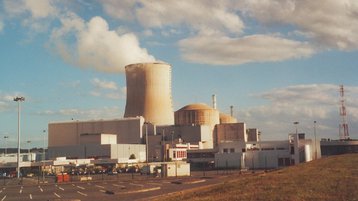The European Parliament has ruled that hydrogen made with France's nuclear-powered electric grid will be classified as "low carbon."
The ruling is part of a set of new EU agreements designed to develop the European hydrogen market, and will be contested by Germany, which has no nuclear power of its own, and argues that nuclear power, while low-carbon, is not renewable and so shouldn't qualify as green energy.
The ruling is one part of the Hydrogen Directive, a large package designed to help the European energy grid shift from natural gas to hydrogen which was set out in December 2021, and finally voted through the Parliament on 9 February.
“The age of hydrogen is coming,” said Jerzy Buzek, an MEP from Poland, who is leading the move for new regulations to back the Directive, according to Eurctiv. “To make it happen in the EU, we need a stable and well-balanced regulatory framework, financial support as well as investments in new infrastructure."
The industry, research, and energy committee backed the full agreement with 62 votes in favor and two against the Directive, and 54 votes in favor and 17 against the regulations supporting it.
The next step is approval by the full European Parliament (a yes/no vote in March) and then negotiations with the 27 EU countries.
The EU estimates that hydrogen and biogas will make up a fifth of final energy consumption by 2050, and wants to have a hydrogen market in place by 2030. Europe is moving in parallel with the US, where the Biden administration's Inflation Reduction Act aims to foster a hydrogen market in that country.
The EU has been criticized for planning a gradual change from methane to hydrogen on the same networks, rather than building a separate infrastructure, with environmentalists warning that fossil fuel companies will use the joint infrastructure to hinder the rival power source. Jens Geier, the German MEP designing the investment rules, says this way will give “more certainty for investments in hydrogen infrastructure based on the existing natural gas grid."
Instead of setting up a new regulatory body for hydrogen, the new gas will be covered by the existing European gas transmission network body ENTSOG, a move that Greenpeace has said is “like letting the foxes design the hen houses."
The transition to a hydrogen network will involve decommissioning a lot of pipework, as the continent won't need the big network used for methane, since domestic heating and cooking is expected to move to heat pumps, district heating, and renewable electricity (there would be little point in converting that electricity to green hydrogen, which would generate waste and leakage in the network of pipes).
The remaining network would deliver hydrogen to industrial sites such as steel plants, needing a concentrated source of heat for decarbonization.
Pro-nuclear definition
France has backed nuclear power heavily and now gets between half and three-quarters of its electricity from that source, which can make hydrogen with a carbon intensity of only 2.77 kgCO2e per kgH2.
Within its hydrogen plans, the industry committee ruled that this low carbon intensity qualifies it as "green" energy - even though the nuclear fuel used is not technically renewable.
The committee adopted the "low-carbon" definition for any hydrogen which is produced with less than 3.38kgCO2e per kg of hydrogen. As it takes around 50kWh of electricity to produce 1kg of hydrogen, the carbon intensity of the electricity used would be 60g of carbon per kWh. Under this definition, hydropower, nuclear and all forms of solar and wind power would qualify biomass (230g per kWh) would not, and gas (490g) and coal (820g) would be way outside the scope, according to figures cited by Wikipedia.
Hydrogen is classified according to a rainbow of colors, with “grey" hydrogen produced from fossil gas having a carbon intensity of 11kgCO2e per kgH2.
Although nuclear hydrogen has got the go-ahead in the EU hydrogen strategy, France will face an argument to get it included in the wider EU Renewable Energy Directive, which is also under debate.
France argues that it is simply realistic to include nuclear power: “Renewables are not the only answer to decarbonization,” said French energy minister Agnès Pannier-Runacher, arguing that nuclear provides baseload electricity with low CO2, while renewable sources are intermittent. EU rules should take this "reality" into account, she told media last week.
If EU definitions of "green" energy exclude nuclear, then this would exclude a major resource from the bloc's efforts to decarbonize.
France has eight other European nations on its side, while the anti-nuclear lobby is led by Germany, and German MEP Markus Pieper has upped the ante by stalling a round of talks on the renewable energy Directive, blaming the halt on a lack of clarity over renewable hydrogen.
On a smaller stage, the UK is believed to be moving towards labeling nuclear as "green" energy, with an announcement by Chancellor Jeremy Hunt predicted within weeks, by the Daily Telegraph.
If nuclear power is billed as "green" then it could encourage investment from the public sector, as such investments would be classified as "sustainable," and the government could also offer funds from green gilts and saving bonds.

